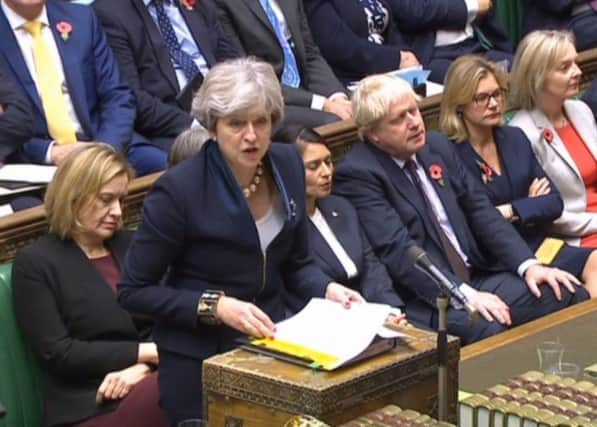Changes to Brexit proposals head off rebellion


Downing Street yesterday confirmed that the Government has accepted an amendment to the legislation that will effectively curb ministers’ powers to sign changes into law without Parliamentary approval.
The move, announced ahead of a sixth day of debate this afternoon, aims to appease a handful of pro-Remain Tory MPs who have expressed opposition to the use of so-called Henry VIII clauses. It appears to have paid off after MPs from across the party lined up to praise the Prime Minister’s breakthrough in negotiations.
Advertisement
Hide AdAdvertisement
Hide AdThe concession comes amid fresh uncertainty over the future of the Irish border deal after the Brexit Secretary David Davis was forced to row back on claims that the offer agreed between the EU and UK last week was “not legally enforceable”. Following a backlash from Dublin, Mr Davis took to the airwaves to reaffirm the Government’s commitment to securing a “frictionless invisible border with Ireland”.
It also comes as Labour signals growing support for a “soft” exit from the EU, with Shadow Chancellor John McDonnell stating that the party would try to stay in a “reformed single market”. At an event in London, Mr McDonnell said a future Labour government would seek a new relationship with the EU that guaranteed tariff-free access to “a single market” and “a customs union”.
The purpose of the EU Withdrawal Bill is to transfer the bulk of EU laws into UK legislation in a bid to avoid a regulatory “cliff-edge” after Brexit.
However, it has faced criticism from opposition parties and some Tory MPs over its use of archaic “Henry VIII” clauses that grant ministers the power to alter some laws without Parliamentary scrutiny.
Advertisement
Hide AdAdvertisement
Hide AdThe Conservative MP and former Attorney General Dominic Grieve has tabled a series of amendments designed to limit these powers, which have gained widespread support.
But in an effort to avoid a defeat, the Government has now accepted a separate amendment – tabled by the chair of the Parliament’s Procedure Committee – which would establish a new panel of MPs to determine which changes should be put to a vote.
Tory backbenchers responded by putting on a united front as the Prime Minister appeared at the Despatch Box to update the Commons on progress in Brexit talks.
Speakers included the prominent Remain supporter Anna Soubry who claimed the party was in “complete unanimity” over the deal reached in Brussels last week, while Brexiteer Iain Duncan Smith joined Ken Clarke in congratulating Mrs May on “driving through an improved agreement”.
However, MPs could still mount a challenge over efforts to enshrine the date of Brexit in law.